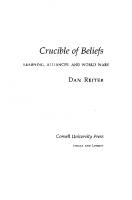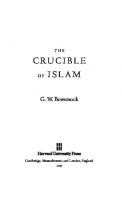Crucible of Beliefs: Learning, Alliances, and World Wars 9781501744761
How do foreign policy-makers learn from history? When do states enter alliances? Beginning with these two questions, Dan
123 31 26MB
English Pages 264 [249] Year 2019
Recommend Papers

- Author / Uploaded
- Dan Reiter
File loading please wait...
Citation preview
Crucible of Beliefs
A volume in the series CORNELL STUDIES IN SECURITY AFFAIRS
edited by Robert J. Art, Robert Jervis, and Stephen M. Walt A complete list of titles in the series appears at the end of this book.
Crucible of Beliefs LEARNING, ALLIANCES, AND WORLD WARS
DAN REITER
Cornell University Press ITHACA AND LONDON
Copyright © 1996 by Cornell University All rights reserved. Except for brief quotations in a review, this book, or parts thereof, must not be reproduced in any form without permission in writing from the publisher. For information, address Cornell University Press, Sage House, 512 East State Street, Ithaca, New York 14850. First published 1996 by Cornell University Press.
The paper in this book meets the minimum requirements of the American National Standard for Information SciencesPermanence of Paper for Printed Library Materials. ANSI Z39·48-1984.
I§
Library of Congress Cataloging-in-Publication Data Reiter, Dan. Crucible of beliefs: learning, alliances, and world wars I Dan Reiter. p. cm.-(Cornell studies in security affairs) Includes bibliographical references and index. ISBN 0-8014-3188-3 1. International relations-Decision making. 2. International relationsPhilosophy. I. Title. II. Series. JX139l.R45 1996 327.1'01-dc20 95-42350
This book is dedicated to my parents, Aryeh and Chana Reiter, with love
Contents
1.
2.
3· 4· 5· 6. 7· 8. 9·
List of Tables Acknowledgments Introduction Learning in International Politics Realism, Balance of Threat, and Alliances Cases, Hypotheses, and Variables Quantitative Results Case Studies: Lessons Heeded Case Studies: Lessons Not Learned? Political Structure and Learning Conclusion Select Bibliography Index
[vii]
ix xi 1
15 41 55 90 122
166 183 203 217 227
Tables
1. Small powers' preferences for neutrality and alliance 2. World war experiences and predicted individual lessons for postwar choices between alliance and neutrality 3· Direct threats and commitments other than great power alliances 4· Logit estimation of the causes of small power alliance choices after World Wars I and II 5· Logit estimation of the causes of small power alliance choices excluding systemic threat military balance variables 6. Predictions of small powers' alliance choices given different levels of systemic threat and different individual lessons 7· Sensitivity analysis of logit estimates for alliance choices, varying the time between observations at 6 and 12 years 8. Sensitivity analysis of logit estimates for alliance choices, varying the time between observations at 6, 12, and 28 years 9· Sensitivity analyses of logit estimates: continuous and dichotomous measures of combined threat 10. Sensitivity analysis of logit estimates: different assumptions about the Soviet threat after World War II 11. Political structure and acting in accordance with lessons about alliance and neutrality 12. Political structure and acting in accordance with lessons about crisis-bargaining strategy 13. Political structure and acting in accordance with lessons about reputation in attempts at extended deterrence [ix]
82 84 89 91 95 97 100 101 103 105 196 200 201
Acknowledgments
This project has taught me that, to paraphrase Steve Walt, learning requires loyal allies. First, I thank my graduate school advisers. Each made a crucial contribution to my growth as a scholar; indeed, the years I spent as a graduate student at the University of Michigan served in many ways as my own crucible of beliefs. Paul Huth displayed incredible patience, offering insightful and welcome advice on all questions large and small. His work exemplified for me the importance of combining case study and quantitative methods of empirical analysis. I was also fortunate to benefit from the genius of Robert Axelrod, whose thinking about modeling and other issues spans the social sciences yet is sufficiently grounded in common sense to be elegantly selfevident. Bob's tenacious insistence on rigor both in the broad thinking and in the details improved the quality of my work immeasurably. Ted Hopf' s boundless enthusiasm makes him, quite simply, one of the best teachers I have ever had. His curiosity about and fascination with political science puzzles served to motivate me. To these three teachers, I offer my greatest thanks. For financial support, I thank the National Science Foundation for a Graduate Fellowship, the John D. and Catherine T. MacArthur Foundation, and the University of Michigan. Thanks also to the John M. Olin Institute for Strategic Studies at Harvard University for providing me with a postdoctoral fellowship to support the completion of the manuscript. Several individuals provided me with much-welcomed feedback. Karl Mueller helped substantially in the case study work. Bear Braumoeller, Allan Castle, Kevin Clarke, Page Fortna, Scott Gartner, and Allan Starn were kind enough to read the manuscript at various [xi]
Acknowledgments
stages and offer helpful advice. Christopher Achen, Nancy Burns, and Greg Markus all contributed to my understanding of quantitative methods of analysis. Thanks also to Scott Bennett, Lars-Erik Cederman, Michael Cohen, Christopher Gelpi, Theodore Gilman, Simon Hug, Ellen Lust-Okar, Craig O'Neill, David Rivera, Ricardo Rodriguiz, David Rousseau, Jennifer Shulman, Gerald Sorokin, Scott Tarry, and Joseph Underhill for feedback. Thanks to Bradford Perkins for improving this project's historical analysis. My research on Belgian history was facilitated greatly by the advice of Jonathan Helmreich and the assistance of Fran


![Sikhism (World Beliefs and Cultures) [Revised, Updated]
1432903179, 9781432903176](https://ebin.pub/img/200x200/sikhism-world-beliefs-and-cultures-revised-updated-1432903179-9781432903176.jpg)






